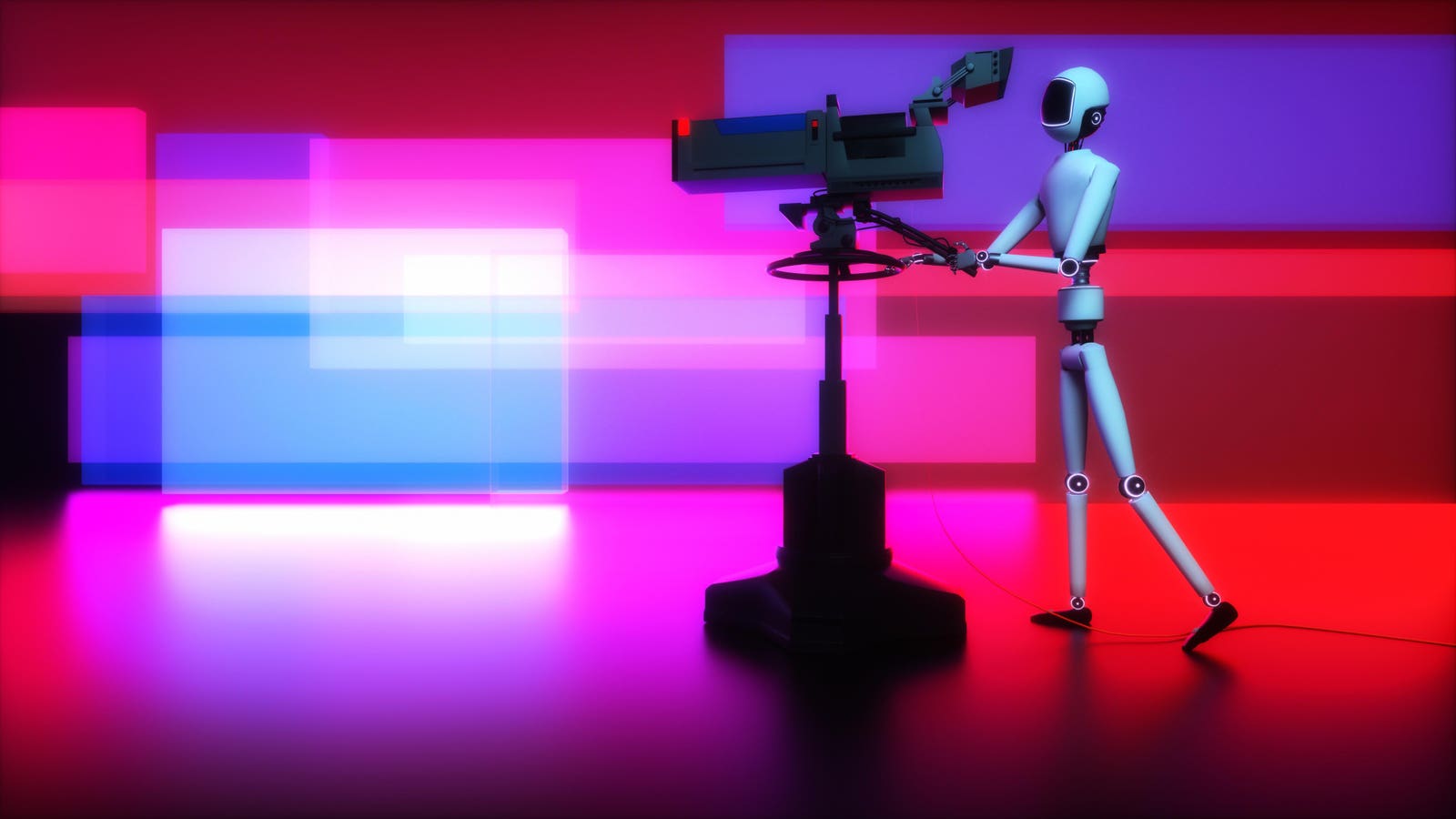How Movie Studios Use Artificial Intelligence

a robotic intelligence works as a cameraman (3d rendering)
getty
The film industry, always at the forefront of technological innovation, is increasingly embracing artificial intelligence (AI) to revolutionize movie production, distribution, and marketing. From script analysis to post-production, Already AI is reshaping how movies are made and consumed. Let’s explore the current applications of AI in movie studios and speculates on future uses, highlighting real examples and the transformative impact of these technologies.
AI in Scriptwriting and Pre-production
AI’s infiltration into the movie industry begins at the scriptwriting stage. Tools like ScriptBook use natural language processing to analyze scripts, predict box office success, and offer insights into plot and character development. For instance, 20th Century Fox employed AI to analyze the script of Logan, which helped in making informed decisions about the movie’s plot and themes. Consider, in pre-production, AI has also aided in casting and location scouting. Warner Bros. partnered with Cinelytic to use AI for casting decisions, evaluating an actor’s market value to predict a film’s financial success. For example, let’s look at location scouting. AI algorithms can sift through thousands of hours of footage to identify suitable filming locations, streamlining what was once a time-consuming process.
Real robotic hand with film stock. Concept of AI in motion picture and photography industry.
getty
AI in Filmmaking and Visual Effects
During filmmaking, AI plays a crucial role in visual effects (VFX). Disney’s FaceDirector software can generate composite expressions from multiple takes, enabling directors to adjust an actor’s performance in post-production. This technology was notably used in Avengers: Infinity War to perfect emotional expressions in complex CGI scenes. Conversely, AI-driven software like deepfake technology, though controversial, has been used to create realistic face swaps in movies. For instance, it was used in The Irishman to de-age actors, offering a cost-effective alternative to traditional CGI. Additionally, AI is used in color grading and editing. IBM Watson was used to create the movie trailer for Morgan, analyzing visuals, sounds, and compositions from other movie trailers to determine what would be most appealing to audiences.
AI in Post-production and Sound Design
In post-production, AI significantly reduces the time and cost involved. Tools like Adobe’s Sensei use machine learning to automate tedious editing tasks, such as object removal and scene stabilization. For sound design, AI algorithms can create realistic soundscapes. Skywalker Sound, part of Lucasfilm, uses AI to categorize and retrieve sounds from their vast library, speeding up the sound design process.
Creative concept. Creator. Visual contents.
getty
AI in Distribution and Marketing
AI’s role extends to movie distribution and marketing. Platforms like Netflix use AI algorithms to suggest films to viewers based on their viewing history, enhancing the user experience and increasing viewership. In marketing, AI tools analyze social media data to gauge audience sentiment and preferences, guiding marketing strategies. For example, Warner Bros. used AI to optimize the marketing of Aquaman, leading to its box office success. Furthermore, AI-powered chatbots are used for promotional campaigns, engaging audiences in innovative ways. The chatbot for the horror movie Morgan interacted with users, creating a personalized and immersive marketing experience.
Future Potential of AI in Movie Studios
Looking to the future, AI’s potential in the film industry is boundless. One emerging application is in virtual filmmaking, where AI could assist in creating realistic virtual environments, reducing the need for physical sets. This technology could revolutionize the way movies are made, offering more creative freedom and reduced production costs. Another area with potential is AI-driven narrative development. AI could analyze audience preferences and societal trends to suggest storylines and genres that are likely to resonate with viewers. This predictive storytelling could lead to more successful films that are closely aligned with audience interests. AI could also enhance immersive experiences in movies, such as augmented reality (AR) and virtual reality (VR). By integrating AI with these technologies, filmmakers could create more engaging and interactive storytelling experiences.
Another application is individualized match making of movie to specific moviegoer. Already, AI systems have been trained in psychographics and neurolinguistics. Through this combination, an AI system understands each person almost as well as a best friend does. Thus, movie studios are looking at a powerful marketing tool that can identify the specific aspects of each movie that would appeal to an individual moviegoer. Moreover, through this AI technology, studios can speak to each person, just like a best friend, to share why the person would enjoy the movie. This is a sharp contrast from today, where only certain aspects, like action, who done it, etc., are played up to the mass audience. This is why companies like 3XM Technologies are revolutionizing the industry.
pointing finger hand arm touchscreen human people person robot technology ai intelligence artificial … [+]
getty
The integration of AI into the movie-making process represents a significant shift in how films are produced, distributed, and marketed. From script analysis to audience engagement, AI is streamlining operations, reducing costs, and enhancing creative possibilities. As technology continues to evolve, the potential applications of AI in the film industry are vast and exciting. Movie studios that embrace these innovations are likely to stay ahead in a highly competitive and rapidly changing industry. The future of filmmaking, shaped by AI, promises to be more efficient, creative, and closely attuned to audience preferences.













